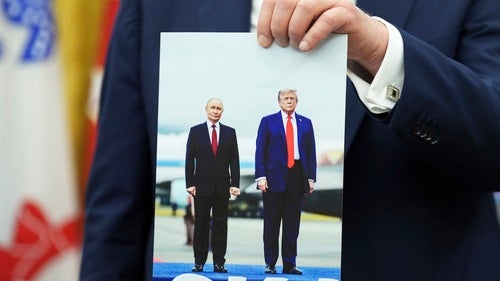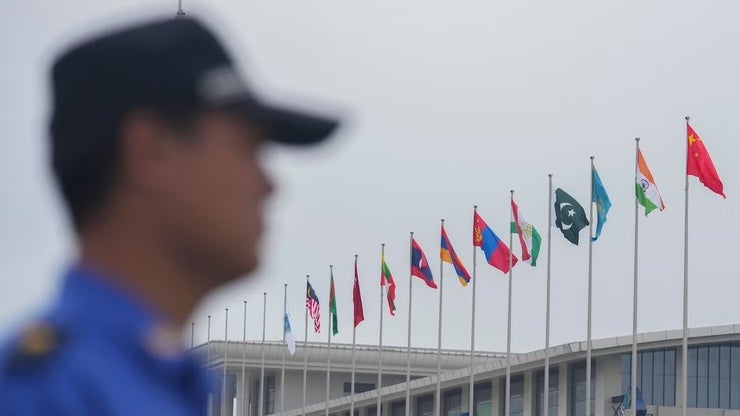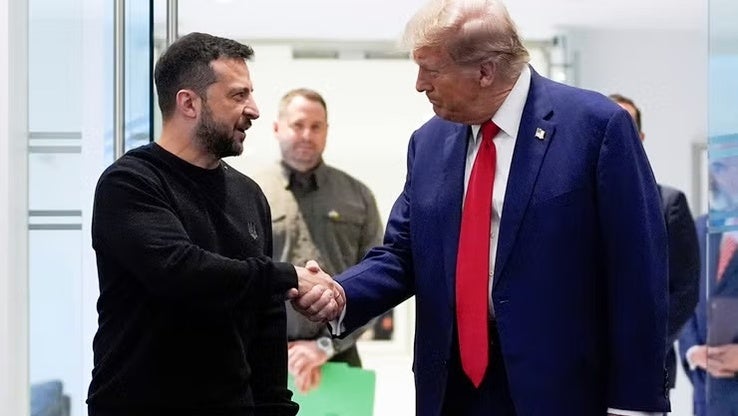What’s Next for US-Russia Relations and the War in Ukraine?

As a Trump-Putin meeting is scrapped and NATO scrambles to steady transatlantic ties, the limits of personal diplomacy and the stakes for Ukraine are coming into sharper focus.
The cancellation of a Trump-Putin meeting and a visit from NATO’s secretary general has reignited questions about Washington’s role in ending the war in Ukraine. Nonresident Senior Fellow of Eurasia Affairs Alexander Cooley explores the breakdown in US-Russia diplomacy, the transactional nature of Trump’s foreign policy, and the challenges NATO faces in its attempt to end the war.
This interview has been edited for length and clarity.
The White House announced that President Trump and Vladimir Putin will no longer be meeting in Budapest. What do you make of this announcement and what does it suggest about the current state of US-Russia relations?
It suggests that the state of relations is volatile and that a lot depends on the prevailing moods and reactions of the two leaders, and that now that these two larger-than-life personalities are trying to get a handle on what's going on in Ukraine, they're being pulled apart by competing interests and influences.
The summitry here is important, but it also points to the limits of summitry. If it were up to them, I think both Putin and Trump would be able to talk and explore "grand bargains," but the constraints get in the way.
The Budapest talks were initially billed as a possible step toward renewed dialogue or even a framework for peace talks. What might its cancellation mean for the prospects of ending the war in Ukraine?
We need to take a step back and realize that after the initial 30 days when the war hadn't been solved and Trump started supporting some of the Ukrainian position and made a big announcement that would allow Tomahawk missile sales to Ukraine, there was a sense of things stabilizing in favor of supporting Ukraine. Now, you're seeing him tilt the other way on the Tomahawks, but he just agreed to sanction Russian oil companies.
This is endemic to Trump's leadership style. Trump likes to go from one side to the other because he likes to be the focus of attention. He likes to be wooed. He likes to be argued with. He likes to be courted. When European leaders got behind Zelenskyy and went to Trump, that was effective. The fact that he is openly being courted by someone like Orbán or Putin matters to him.
The reason I say this is that in very difficult geopolitical situations, and this is one of them, there's no simple peace plan. There's no easy formula. Trump himself doesn't particularly care about the details, but he does see politics as a balancing act. I think we can expect similar pendulums to swing back and forth with different sides projecting what they hope to see when it comes to Trump's behavior.
Just last week, Trump hosted Ukrainian President Volodymyr Zelenskyy at the White House. How significant was that meeting, both symbolically and substantially, for the US-Ukraine relationship?
It went a lot better than the previous visit to the White House. I think most would agree that one was a bit of a disaster for the Ukrainian president. But he regrouped. He tried to figure out where the points of leverage and influence are. I think they got one thing right, which was a concerted European effort to emphasize the importance of doing this. I think that Europe’s willingness to pitch in and buy the weapons systems from the US for Ukraine, seemed like a transactional deal that was supported by all parties.
Apparently, the Tomahawk missile deal was a bridge too far. Moscow signaled that they would consider this to be an act of war, an act of belligerence—if we were to send tomahawks to Ukraine, it would be perfectly in their right to station missiles very close to the American homeland.
On the ground, the war in Ukraine appears to have reached a stalemate. What are the main factors preventing either side from moving toward a negotiated settlement?
Part of it depends on how you frame the conflict. If we view it as a territorial conflict—which is very tempting to do since many conflicts in the world are primarily about physical territory, geography, sovereignty, and borders—then the solution is trading territory. Taking the maps, freezing where we are, perhaps negotiating land swaps and making concessions.
The problem is that this conflict has never been about territory. The conflict has always been about Ukraine's foreign policy orientation and the question of if Ukraine has an independent right to make foreign policy and security choices for itself. Or if Russia, because Ukraine is in its neighborhood and some would say it's region of “special interest”, has a right to veto or influence those decisions and choices. That's what drives this conflict.
"The problem is that this conflict has never been about territory."
The territorial part is secondary to the political architecture that surrounds it. Does Russia get a say in future Ukrainian foreign policy? If Ukraine is meant to accept neutrality, what does that mean practically? Who are the peace guarantors, the multinational force? What role is at the table for them? And perhaps most significantly, what wins does Ukraine get from all of this? Does it get European Union membership? Something that it didn't have before to make it domestically palatable to accept the territorial concessions that are being discussed?
The territory is important, but I think perhaps because we're fixated on territorial conflicts in places like Gaza, we’re missing that with Ukraine, the political dimension is what's going to make the peace lasting or not.
From Moscow’s perspective, what does Putin gain by engaging or disengaging with the United States right now, especially given the stalled frontlines and Western sanctions?
This is a challenging period for Moscow. When the conflict started, Moscow framed it as an attempt to demilitarize and denazify Ukraine, which it thought had gone all in with the West and these militaristic kinds of ideas and tropes. That framing perhaps swayed some Russians, but it had very little impact on the rest of the world. However, Moscow did something quite discernible in the summer of 2022, and it pivoted to framing this conflict more as a war against the US-led liberal order.
When you look at Putin's annexation speeches, there are all sorts of things in there about geopolitical grievances. They include US double standards, triple standards, the dollar, technology, US hypocrisy, and that the US is a colonizer. It was just this litany of grievances. As it turns out, that kind of messaging was more effective in the Global South than the previous messaging because most areas and countries in the world have some sort of issue or dissatisfaction with the US-led hegemonic order. It had resonance. So, when you talk about global public opinion—maybe not necessarily siding against Ukraine but being a lot more sympathetic to Russia—it's because they managed to globalize the messaging of the conflict.
In the early weeks of the Trump administration, we saw a few symbolic actions, including at the UN where the US sided with Russia, and I think Russian commentators and analysts were optimistic that it meant the conflict would end more on Moscow's terms. That hasn't happened. For Moscow now, there is concern and confusion. Trump is unpredictable. He is not enamored with transatlantic alliances like NATO, but it's not clear what he’s for. It has been tough for Russia to get a handle on Trump in terms of pushing for a final deal.
Looking back, how does this period of tension and uncertainty compare to previous inflection points in the US-Russia relations, such as the late Cold War or early post-Soviet years?
One thing that has characterized US-Russia resets over the course of the post-Cold War is an enduring faith that two presidents can set the tone for more constructive relations. That has always been the case. Clinton and Yeltsin. Bush and Putin after September 11. An attempt at a reset between Obama and Putin. You see these periodic attempts where the relationship is not good, and we don't have the same priorities—perhaps we're not even talking to each other—so we have a high-level summit.
Inevitably, all of these efforts have failed. Why? At heart, they've failed because the US has always refused to do the number one thing that Russia wanted it to, which is pledge to allow Russia to have a zone of outsized political influence in its neighborhood. But whether it’s Central Asia hosting military bases for Afghanistan, or supporting pro-Western governments in places like Georgia, Ukraine, and Moldova, or expanding NATO, the US has sort of steadfastly said, these are the sovereign choices of these countries to make. We're not going to dictate. That's the number one issue that has always divided the two countries.
In the mid-2000s, the issue of promoting democracy also divided Russia and the US. Russia came to think of promoting democracy as the US overthrowing governments and regimes and replacing them with ones that were unfriendly to Moscow.
But this question of who makes the rules, whose sovereign space it is, is what we always keep coming back to—no matter how cordial the personalities are and no matter how good the intentions are between Moscow and Washington.
A day after the White House announced that the meeting between Trump and Putin would not be moving forward, NATO’s secretary general traveled to Washington to meet with Trump. What does that reveal about Trump’s relationship with NATO and what does it suggest about the alliance’s role in the conflict going forward?
Trump's relationship with NATO has obviously been thorny and rocky. Trump is a transactionalist. He views commitments to alliance structures and smaller states as inherently ephemeral and probably as weighing him down. Why yield fealty to this sort of anachronistic structure? If we're going to do deals, just do them.
There was concern that Trump would pull out of NATO in his second term, just as he pulled out of other international agreements and organizations. That is not happening. Part of the reason, I think, is that Trump sees NATO as a potential power resource that he can influence and transform.
The secretary general of NATO wants to keep the alliance robust and intact. He's walking a tight line between the kind of shared values of their organizations and the personal political leanings and beliefs of the American president, who leads, by far, the most important country in NATO. I think Trump will try and instrumentalize the use of NATO to try and implement what his vision is for the end of the war.
As you look ahead, what indicators will you be watching to gauge whether Russia and Ukraine are moving toward peace?
We have to recognize that there is not going to be a single “aha” kind of bargain or moment. I think there's a lot of temptation on both sides to want to have a grand deal where all these issues are worked out: The territorial issues, the political issues, and justice and accountability issues. That is not going to happen.
There are at least four tracks that are going to continue for a while, so I would take them in that order and sequence. I would think about what is being advanced as a territorial formula—calls to freeze lines, to swap territory. What would that entail? What is the political solution involved here in terms of security guarantees? Who is willing to step in? And this is something we don't talk about on the Russian side—will the Russians insist on bringing some of their own Eurasian partners to the table? We think of this as a European war, but who are Russia's allies in this? They're North Korea, they're China that's helping with exports, or Iran, which has been supplying it with drones.
"We have to recognize that there is not going to be a single 'aha' kind of bargain or moment."
Then there's the question of economics, reconstruction, and sanctions relief. That's a distinct track. And then the accountability track, is something I think this US administration is less enthusiastically supporting. All of these tracks have to proceed, but they all sort of inform one another and interlock with one another. I would look at progress across each of these dimensions and see whether there's frameworks of deals being finalized.
It sounds then like there's not going to be a big deal, which we know Trump in particular likes, as we've seen recently with his approach to the war in Gaza. Given that there isn’t likely to be this “aha” moment, do you think Washington has the political will to play a meaningful role in negotiations? And does it have the leverage?
I think Trump is going to want some sort of credit-taking moment, some sort of symbolic moment that he will frame as the deal. The problem is that all these issues need to be worked out because Ukraine has considerable capabilities and the domestic support and willingness to keep fighting. There's a sense that it's not one side that holds all the coercive power, which has been the case sort of in Gaza. Both sides have considerable cards to play, which makes it much harder to pretend that something symbolic is actually going to be lasting and substantive.
I do think the Trump people would prefer to declare that something has been done and then kind of rid themselves of the responsibility. I think that's clear and they've sort of said as much. But again, once this issue starts linking up to other areas, be it insecurity or questions about economic sanctions or even questions about China's role, then it's not so easy to compartmentalize this as just being a European or a Ukrainian conflict.
My best guess is that they will, at some point, declare a general framework, but parts of this will recur and keep coming back.
What else should people understand about this conflict?
One interesting dimension is just the fascinating way in which domestic politics in the US has become wrapped up with the Ukraine war. When Ukraine was invaded in February 2022, there was a moment of unity. Partisans coalesced around Ukraine, arming Ukraine and providing aid and security support. What you've seen since then is the various ways in which different domestic political factions here have gotten entangled.
Certain factions viewed Zelenskyy as having entrapped the president during his first term in a call that got him impeached. Another campaign theme was aid for the border, not for Ukraine, with Ukraine being used as a symbol of America's excessive focus on global commitments as opposed to problems back home. There was a significant constituency in the Republican Party that wanted to cut Ukraine off. This factionalism complicates the story and makes the politics of it super interesting.
The domestic politics in the US has been far more volatile than we anticipated, swinging back and forth and turning Ukraine from what was a bipartisan issue to a much more sort of polarized issue.


Related Content

